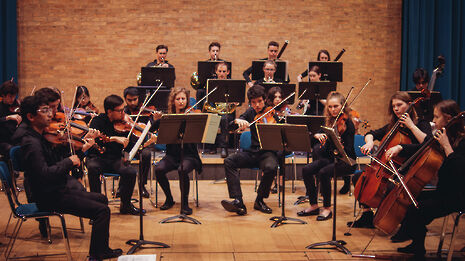Concert review: Peter Donohoe performs Shostakovich and Mozart
Gus Mitchell was refreshed by a direct, entertaining performance from Cambridge University Chamber Orchestra and the internationally
acclaimed pianist Peter Donohoe

Might the conductor-less orchestra take off? It’s a fascinating thing to watch, and made all the more interesting by the rather radical (for classical music, that is) democratisation it might be lending to the interpretation of pieces. While I know nothing about the hierarchy of the Cambridge University Chamber Orchestra (CUCO), they certainly played their programme, both individually and with pianist Peter Donohoe, with a unity and spirit that was really refreshing. One began to see just what kind of appeal this new way of doing things might have for democratically-minded, experimental younger musicians. Despite this, first violin and orchestra leader Aditya Chander seemed emphatically in command throughout, and the orchestra seemed almost like a more cohesive, inter-responsive unit than many conductor-orchestras. It may be that the reduction in deep concentration and dependence on the conductor goes some way towards releasing a more individual spirit in each player, and there was great energy radiating from the opening piece, Mozart’s Little G Minor Symphony.
Totally individual and full of youthful angst, the CUCO played Mozart’s piece with fervour and rushed out the opening motif at a perfect tempo, progressing through the first movement with a measured determination that made the repeated leaps and strange syncopations particularly insistent.
“You could feel the mood bouncing onto the orchestra from [Donohoe's] incredibly rhythmic, virtuosic and tonally shimmering playing”
Peter Donohoe, one of the grand (impressive beard and all) men of British music right now, then took to the stage to perform two concertos with the orchestra. This nominally meant leading them as well, but I suspect that most of the leading stayed with Chander, because there’s not much room within either Shostakovich’s 2nd nor Mozart’s 20th concertos for any full-fledged pianist-conducting. I don’t know how many rehearsals Donohoe and the CUCO had but they were, for the most part, wonderfully complementary, with Donohoe taking an expected seniority. You could feel the mood bouncing onto the orchestra from his incredibly rhythmic, virtuosic and tonally shimmering playing.
A lack of initiative sometimes allowed the music simmer and ruminate, so the onward propulsion of Shostakovich’s lively and uncharacteristically cheerful 2nd concerto was very welcome. Donohoe handled the balance of Shostakovich’s (intentionally?) humorously neo-classical lyricism very well. The orchestra gave him confident support, and there was a wonderful eruption of energy whipped up between soloist and orchestra toward the end of the final Allegro, as Donohoe’s crisp playing illuminated Shostakovich’s humorous take on repetitious ‘Hanon’ exercises and (possibly) the kind of crushingly dull socialist realism music that he was being expected to write. The essential humour of the piece was well brought off, and many a chuckle in the audience greeted the final flourish, which is always a good sign.
However, I do wish that the energy had been maintained until the last piece, since Mozart’s 20th concerto, like his symphony, requires great commitment to see through its astonishing, 20-minute journey through, anxiety, capitulation, despair and acceptance, all before a defiant, pre-Beethovenian finale. While the opening, in the shady, Don Giovanni-esque D Minor, was promising, the orchestra didn’t quite manage to maintain consistent energy as they had in the earlier symphony, and the detail and togetherness flagged in patches. Donohoe’s straight drive helped the piece in some places but hindered it in others – I still haven’t decided whether his and the orchestra’s take on the transcendental slow-movement Romanza (more direct than most versions I’ve heard) was wonderfully revealing or slightly missed the point. A flubbed entry or two in the winds (notably in the final movement), who seemed like a bit of weak link throughout the night, also distracted from achieving concentration and unity in bringing off Mozart’s incredible intensity, but there were certainly enough moments of nervy, sorrowful or angry beauty brought out of the piece that I’d listen again.
But, overall, it was definitely a refreshingly direct and entertaining night of music-making
 Features / Should I stay or should I go? Cambridge students and alumni reflect on how their memories stay with them15 December 2025
Features / Should I stay or should I go? Cambridge students and alumni reflect on how their memories stay with them15 December 2025 News / Cambridge study finds students learn better with notes than AI13 December 2025
News / Cambridge study finds students learn better with notes than AI13 December 2025 News / Dons warn PM about Vet School closure16 December 2025
News / Dons warn PM about Vet School closure16 December 2025 News / News In Brief: Michaelmas marriages, monogamous mammals, and messaging manipulation15 December 2025
News / News In Brief: Michaelmas marriages, monogamous mammals, and messaging manipulation15 December 2025 Comment / The magic of an eight-week term15 December 2025
Comment / The magic of an eight-week term15 December 2025








